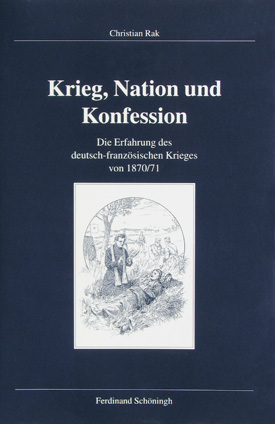Rak, Christian: Krieg, Nation und Konfession. Die Erfahrungen des deutsch-französischen Krieges 1870/71, Paderborn [u. a.] 2004

The German Empire was born on the battlefields of France, while Prussia’s special calling in German history appeared to reach its culmination in the Hall of Mirrors at Versailles. Yet despite massive efforts by the new empire’s propagandists, the rhetoric of unity only papered over what continued to be deep rifts between north and south, conservative and democratic, and above all, Catholic and Protestant.
This rift is especially visible in the divergent meanings that Catholic and Protestant army chaplains attributed to the war of 1870–71. Aided by a sociocognitive conception of experience, Christian Rak examines the interpretations that these chaplains developed for themselves and others, based on experiences with their own soldiers, from private to general, and encounters with the enemy. Rak relies on a broad range of sources, including personal letters, service reports, field sermons, newspaper accounts, as well as post-war memoirs by clergymen of both confessions.
This book constitutes a persuasive and innovative contribution to research on interconfessional competition over the essence and goal of the German nation at the time the empire was founded. Rak also rediscovers the long-lost, largely ignored Catholic contribution to the cultural construction of the German nation. This study of the 1870–71 war, in which the conflict between religious and national loyalty reached a new high point for Catholics, provides enlightening new answers to questions about Catholicism’s relationship to the Protestant-dominated empire.
The author also reveals Germans’ selective and subjective perceptions of the war, as well as how apparently individual responses actually originated in collective patterns, before streaming back into the pool of common knowledge as modifying or strengthening currents. Rak’s study thereby also represents an important methodological enrichment to the field of military history.
To order our publications, please, contact your local bookshop or the publishing house Schöningh in Paderborn.
